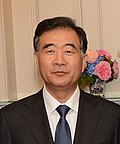List of vice premiers
The vice premiership of the PRC was created since the establishment of the People's Republic of China on 1 October 1949.
- Generations of leadership
First Administration Second Administration Third Administration Hu–Wen Administration Xi–Li Administration
| No. | Portrait | First-ranked Vice-Premier | NPC | Term of office | Premiers | |||||
|---|---|---|---|---|---|---|---|---|---|---|
| Vice Premiers of the Government Administration Council of the Central People's Government (1949–54) | Zhou Enlai | |||||||||
| — | 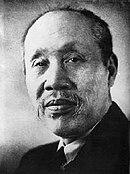 | Dong Biwu 董必武 (1886–1975) Hubei At-large | CP | 1 October 1949 | 15 September 1954 | |||||
Other Vice-Premiers:
| ||||||||||
| Vice Premiers of the State Council of the People's Republic of China (1954–present) | ||||||||||
| 1 |  | Chen Yun 陈云 (1905–1995) Shanghai At-large | I | 15 September 1954 | 18 April 1959 | |||||
| Other Vice-Premiers: Lin Biao (2nd), Peng Dehuai (3rd), Deng Xiaoping (4th), Deng Zihui (5th), He Long (6th), Chen Yi (7th), Ulanhu (8th), Li Fuchun (9th), Li Xiannian (10th) | ||||||||||
| II | 18 April 1959 | 21 December 1964 | ||||||||
| Other Vice-Premiers: Lin Biao (2nd), Peng Dehuai (3rd), Deng Xiaoping (4th), Deng Zihui (5th), He Long (6th), Chen Yi (7th), Ulanhu (8th), Li Fuchun (9th), Li Xiannian (10th), Nie Rongzhen (11th), Bo Yibo (12th), Tan Zhenlin (13th), Lu Dingyi (14th), Luo Ruiqing (15th), Xi Zhongxun (16th) | ||||||||||
| 2 | 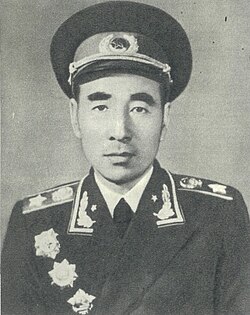 | Lin Biao 林彪 (1907–1971) PLA At-large | III | 21 December 1964 | 13 September 1971 (died in office) | |||||
| Other Vice-Premiers: Chen Yun (2nd), Deng Xiaoping (3rd), He Long (4th), Chen Yi (5th), Ke Qingshi (6th), Ulanhu (7th), Li Fuchun (8th), Li Xiannian (9th), Tan Zhenlin (10th), Nie Rongzhen (11th), Bo Yibo (12th), Lu Dingyi (13th), Luo Ruiqing (14th), Tao Zhu (15th), Xie Fuzhi (16th) | ||||||||||
| 3 | 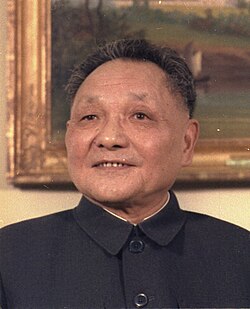 | Deng Xiaoping 邓小平 (1904–1997) Beijing At-large | III (cont) | 13 September 1971 (acting) | 4 January 1975 | |||||
| Other Vice-Premiers: Chen Yun (2nd), He Long (3rd), Chen Yi (4th), Ke Qingshi (5th), Ulanhu (6th), Li Fuchun (7th), Li Xiannian (8th), Tan Zhenlin (9th), Nie Rongzhen (10th), Bo Yibo (11th), Lu Dingyi (12th), Luo Ruiqing (13th), Tao Zhu (14th), Xie Fuzhi (15th) | ||||||||||
| IV | 4 January 1975 | 5 March 1978 | Zhou Enlai (1975–1976) Hua Guofeng* (1976–1978) | |||||||
| Other Vice-Premiers: Zhang Chunqiao (2nd), Li Xiannian (3rd), Chen Xilian (4th), Ji Dengkui (5th), Hua Guofeng* (6th), Chen Yonggui (7th), Wu Guixian (8th), Wang Zhen (9th), Yu Qiuli (10th), Gu Mu, Sun Jian (11th) | ||||||||||
| V | 5 March 1978 | 10 September 1980 (resigned) | Hua Guofeng | |||||||
| Other Vice-Premiers: Li Xiannian (2nd), Xu Xiangqian (3rd), Ji Dengkui (4th), Yu Qiuli (5th), Chen Xilian (6th), Geng Biao (7th), Chen Yonggui (8th), Fang Yi (9th), Wang Zhen (10th), Gu Mu (11th), Kang Shi'en (12th), Chen Muhua (13th) | ||||||||||
| 4 | Wan Li 万里 (1916–2015) Anhui At-large | V (cont) | 10 September 1980 (acting) | 6 June 1983 | Zhao Ziyang | |||||
| Other Vice-Premiers: Li Xiannian (2nd), Xu Xiangqian (3rd), Ji Dengkui (4th), Yu Qiuli (5th), Chen Xilian (6th), Geng Biao (7th), Chen Yonggui (8th), Fang Yi (9th), Wang Zhen (10th), Gu Mu (11th), Kang Shi'en (12th), Chen Muhua (13th) | ||||||||||
| VI | 6 June 1983 | 25 March 1988 | Zhao Ziyang (1980–1987) Li Peng* (1987–1988) | |||||||
| Other Vice-Premiers: Yao Yilin (2nd), Li Peng* (3rd), Tian Jiyun (4th), later: Qiao Shi | ||||||||||
| 5 | 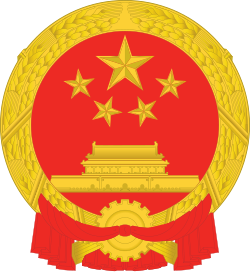 | Yao Yilin 姚依林 (1917–1994) Jiangxi At-large | VII | 25 March 1988 | 5 March 1993 | Li Peng | ||||
| Other Vice-Premiers: Tian Jiyun (2nd), Wu Xueqian (3rd), later: Zou Jiahua, Zhu Rongji | ||||||||||
| 6 |  | Zhu Rongji 朱镕基 (1928–) Hunan At-large | VIII | 25 March 1993 | 17 March 1998 | |||||
| Other Vice-Premiers: Zou Jiahua (2nd), Qian Qichen (3rd), Li Lanqing (4th), later: Wu Bangguo, Jiang Chunyun | ||||||||||
| 7 |  | Li Lanqing 李岚清 (1932–) Jiangsu At-large | IX | 17 March 1998 | 17 March 2003 | Zhu Rongji | ||||
Other Vice-Premiers:
| ||||||||||
| 8 |  | Huang Ju 黄菊 (1938–2007) Shanghai At-large | X | 17 March 2003 | 2 June 2007 (died in office) | Wen Jiabao | ||||
Other Vice-Premiers:
| ||||||||||
| — |  | Wu Yi 吴仪 (1938–) Zhejiang At-large | X (cont) | 2 June 2007 (acting) | 17 March 2008 | |||||
Other Vice-Premiers:
| ||||||||||
| 9 |  | Li Keqiang 李克强 (1955–2023) Liaoning At-large | XI | 17 March 2008 | 15 March 2013 | |||||
Other Vice-Premiers:
| ||||||||||
| 10 |  | Zhang Gaoli 张高丽 (1946–) Tianjin At-large | XII | 16 March 2013 | 19 March 2018 | Li Keqiang | ||||
Other Vice-Premiers:
| ||||||||||
| 11 |  | Han Zheng 韩正 (1954–) Shaanxi At-large | XIII | 19 March 2018 | 12 March 2023 | |||||
Other Vice-Premiers:
| ||||||||||
| 12 |  | Ding Xuexiang 丁薛祥 (1962–) Jiangsu At-large | XIV | 12 March 2023 | Incumbent | Li Qiang | ||||
Other Vice-Premiers:
| ||||||||||













